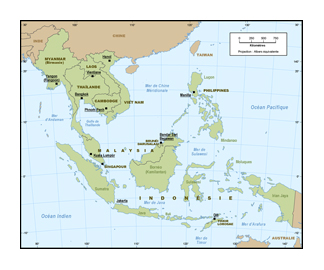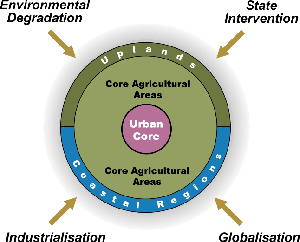Background and the Chair's Mission
The mandates

Established in July 2002, the Canada Chair of Asian
Research is attached to the Centre
d'études de l'Asie de l'Est (CÉTASE) of the Université de
Montréal. Founded in 1976, the CÉTASE has focused on studies of East Asia stricto sensu,
essentially China, Korea, Japan and Taiwan.
One of the mandates
of the Chair consists of broadening to Southeast Asia
the focused area of activities of the Centre. The
Southeast Asian region is composed of the eleven following
states: Burma (Myanmar), Thailand, Cambodia, Laos,
Vietnam, Philippines, Malaysia, Singapore, Brunei,
Indonesia and East
Timor (or Timor-Leste).

this map is only availalbe in French for the moment
The second fundamental mandate is the research itself.
Among various research topics, a very detailed attention is given to analysing the agrarian
foundations behind Southeast Asian society dynamics and economies.
The research agenda is, in sorts, a continuation of
a cycle of studies developed by the Chair holder for over thirty years of which the
privileged subject has been the multiscale conditions and consequences of historical
and contemporary evolution of agrarian societies of Southeast Asia. In this context,
comparisons with equivalent processes among Southeast Asian societies sensu stricto have
already been initiated.
The present fundamental objective consists in identifying
and interpreting the specificities, assets and vulnerabilities of said societies in their
accelerated venture towards urbanisation and industrialisation, being understood that they
are, ones and others, at different levels of advancement in this process.
The research program

Working objectives
The intention is therefore to further
and broaden the analysis of agrarian foundations of contemporary economic
dynamics of all regions and countries of Oriental Asia, as well as their specific
consequences, at historic and contemporary scales.
In this respect, beyond the spectacular
success of East Asian industrial economies, and even many those of Southeast
Asia, it is important to underline the following: the agrarian past of countries
such as Japan, South Korea and Taiwan is not far behind, it's mark remaining relevant
in each of the concerned societies, where as the agrarian present remains definitely
dominant in the People's Republic of China as well as in the majority of Southeast Asian
countries, and even in North Korea.
Thus, the key themes being studied are:
- the East and Southeast Asian agrarian transformations;
- the links between agrarian transformations, industrialisation, migration and urbanisation;
- the environmental impacts of the agrarian transformations, such as deforestation and micro-climate changes;
- the impacts of agricultural expansion and deforestation on ethnic minorities;
- the articulations, at regional and country levels in Southeast Asia as well as between these and the rest
of Oriental Asia, in regards to agricultural and forestry markets, which leads to the following:
- the role of globalisation in agrarian and environmental transformations in Pacific Asia;
- the geopolitical implications, internal as well as external, resulting from competitions inherent of
these transformations.

Such studies must rely on teamwork. It is thus a matter
of, firstly, articulating the pursuit of these objectives with those of the university,
particularly the CÉTASE's and the researchers attached to it, secondly, broadening this
articulation to external research networks, local, national and international. The realisation
of such converging research will articulate itself around the aforementioned propositions.
The projects and present collaborations
An important project
is under way under the banner of the Major Collaborative
Research Initiative program of the Social
Sciences and Humanities Research Council of Canada
(SSHRC). The Challenges of the Agrarian Transition
in Southeast Asia (ChATSEA) comprises 21 researchers
from and their teams, it's objective consists in improving
the knowledge of the agrarian transition. For more
information please consult the ChATSEA
section of this web site.
A second, but not as ambitious, project is also
being led at the Chair, Le modèle de développement agricole Sud-Est asiatique : atouts et
vulnérabilités devant la crise (the Southeast Asian agricultural development model: assets
and vulnerabilities in view of the crisis), which is supported by the SSHRC.
Completed work
Completed in 2004, Localized
Poverty Reduction in Vietnam / La réduction de la
pauvreté locale au Vietnam, relied on a collaboration
with the Université
Laval, the University
of British Columbia (UBC), five Vietnamese universities
as well as the National Centre of Social and Human
Sciences of Vietnam. This project was supported by
the Canadian
International Development Agency (CIDA). Understanding
Poverty in Vietnam and the Philippines: Concepts and
Context is a compilation of papers resulting from
the project, we invite you to consult and download
it in the Publications
section of our web site.
|